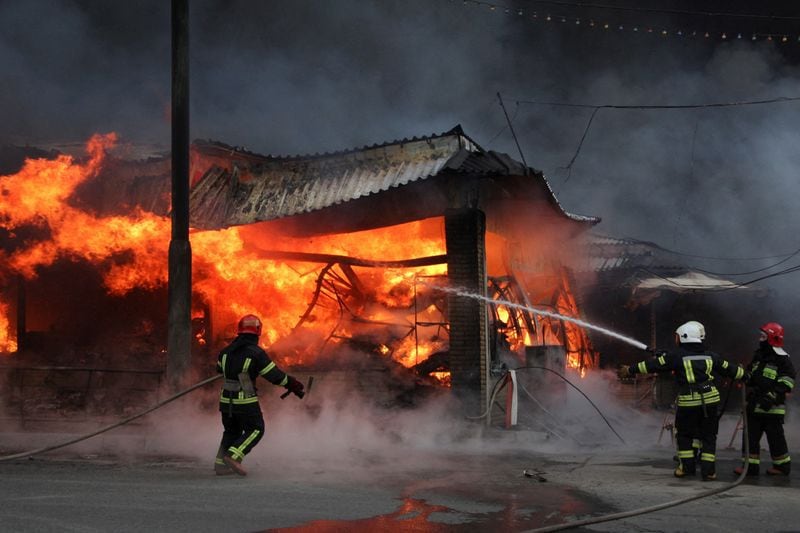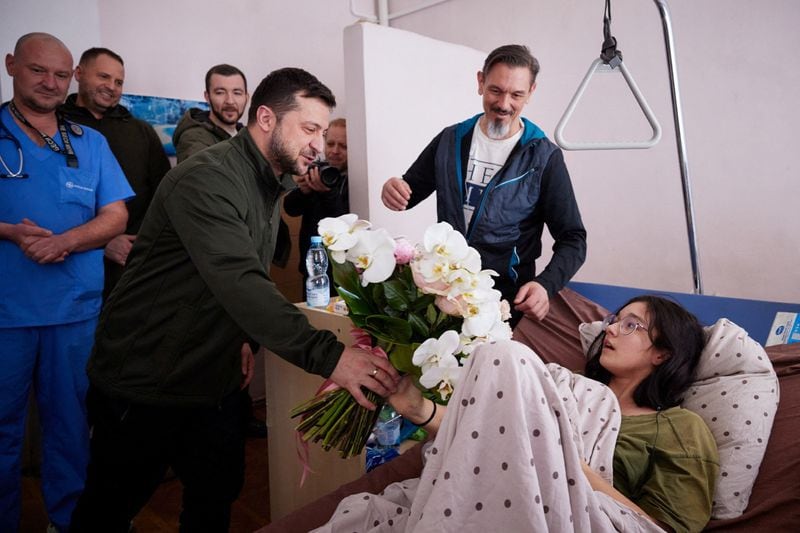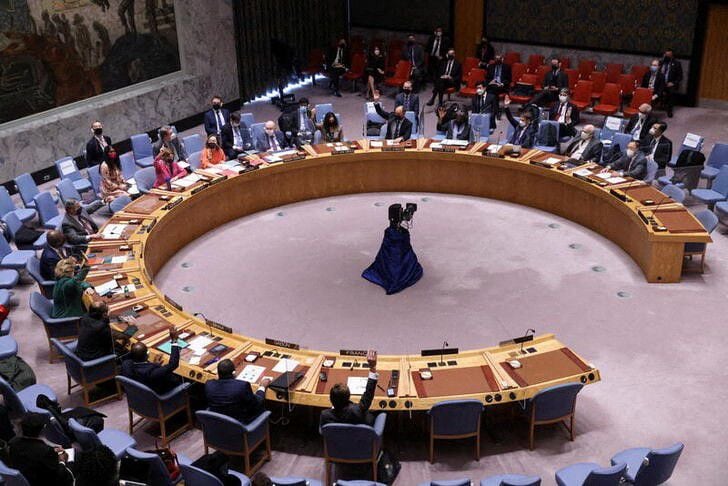
While there is speculation about the peace negotiations between Russia and Ukraine, international organizations continue to move forward. This week, the International Court of Justice ordered Russia to suspend all its military operations. But, at every turn, the same question arises: who is going to force Putin to comply if he has veto power in the UN Security Council? Was it not enough exhibitionism that he announced the invasion of Ukraine while the Council was meeting, precisely, to address that crisis?
Since the invasion of February 24, there have been actions by the UN General Assembly, the International Criminal Court, the Human Rights Council (which Argentina presides) and the European Court of Human Rights. In addition, this week the International Court of Justice recognized in principle its jurisdiction to hear the complaint filed by Ukraine and issued precautionary measures in its favor.
By 13 votes to 2 (one by the Russian judge and the other by the Chinese judge), the Court ordered Russia to suspend all its military operations and to ensure that official troops, irregularly armed personnel, as well as organizations or individuals under its control, stop moving forward. In addition, it unanimously determined that both nations must refrain from any conduct that could aggravate the situation.
Is the war over, then? Of course not.
National courts may enforce their sentences with coercive measures applied by third parties (for example, they order a bank to seize an account or the police to arrest a person), but regional or international judicial bodies do not have police. In the case of the International Court of Justice, if Russia fails to comply with the precautionary measures (which, in fact, it is already doing), Ukraine could appeal to the Security Council, which under Article 94.2 of the Charter of the United Nations can make recommendations or issue measures to ensure that the court's decision can be enforced.

What is the problem? That Article 23 of the Charter provides that China, France, Russia, the United Kingdom and the United States are permanent members of the Security Council (the so-called “5P”) and, in turn, Article 27 provides that all decisions other than procedural matters require 9 affirmative votes out of 15 total members (up to 1965 there were 7 about 11), but they must include the concurrent will of the 5Ps.
This is the famous veto. If only one of the 5Ps rejects a draft resolution on non-procedural issues, it falls out. It is the so-called “Yalta formula”, the Council voting system agreed upon by Stalin, Churchill and Roosevelt in Crimea (paradoxically annexed by Putin in 2014!) and which was eventually adopted, with strong resistance from other countries (Australia was the most notable), at the San Francisco Conference which ended on 26 June 1945 with the signing of the Charter.
Russia has already used its veto in the invasion of Ukraine. On February 25, the day after the start of the war, Albania and the United States presented a bill before the Council to condemn the Putin regime in harsh terms, describe the invasion as a violation of the fundamental principles of the UN and order it to immediately suspend the use of force, the withdrawal of troops and the rectification of their recognition of independence to Donetsk and Luhansk.
The resolution had 11 votes in favor, 3 abstentions (China, India and the United Arab Emirates) and the obvious veto of Russia, which made it a bun and threw it in the trash. It is therefore expected that it will do the same if Ukraine goes to the Council under Article 94.2 of the Charter to ask it to compel the Putin government to comply with the precautionary measures issued by the International Court of Justice. Veto, veto, veto.

So there's nothing to be done? Is the decision of the main court of justice on the planet an expression of wishes or, at most, one more piece of paper to be fastened together with other recommendations, orders and symbolic convictions that attempt to isolate Putin and force him to negotiate? Is international law so useless? Not necessarily. In the chest of memories of the UN are two interesting old toys.
The first is an old rule adopted by the General Assembly in 1950: resolution 377, known as “uniting for peace”, created to avoid Russia's continued vetoes in the Korean War. What does it say? That when, due to lack of agreement between the 5Ps, the Security Council does not act to preserve international peace and security (its main mission), the Assembly itself can recommend collective action to UN members. This includes, for peace breaks or acts of aggression, the use of force.
If the Assembly is not in session, a special emergency session can be convened in 24 hours. Who can ask for it? A majority of its members or the Security Council itself by 9 votes, but in this case there is no longer a veto because it is a procedural decision.
Resolution 377 has been used about 10 times since 1950 and is already under way for the invasion of Ukraine. On 27 February, two days after the Russian veto failed the Albanian-US project in the Council, the same 11 members who had tried to condemn Russia convened a special session of the General Assembly in the language of “uniting for peace”. The same 3 countries (China, India and the Arab Emirates) abstained and Russia voted against it again, but no longer veto power.
The Assembly did indeed meet in a special session and issued a resolution strongly condemning Russia in terms almost identical to those of the draft that had failed in the Council. It is still, for the time being, a recommendation with symbolic content, but, at least in theory, resolution 377 would make it possible to appeal to the use of force if strictly necessary to restore international peace and security.

The second strategy that would make it possible to limit Russia's veto power is the obligation to abstain from voting in disputes of its own. Article 27.3 of the Charter of the United Nations provides that in decisions taken by the Council for the peaceful settlement of disputes, countries that are parties to the dispute cannot vote. Although the rule applies to all members of the Council (not just the 5Ps), it is an indirect way of eliminating the veto in some cases.
But beware, the duty of abstention does not exist for the decisions of the famous Chapter VII, which are those that allow the use of force to maintain or restore international peace and security. For the Council to order the use of force, the 5Ps must agree. On the other hand, it does apply to Council decisions under Article 94.2 of the Charter (recommendations for a country to comply with a ruling of the International Court of Justice), provided that this does not involve Chapter VII actions.
In practice, abstention was rarely used. Until 1951 there were some cases, but then he went into a deep sleep. Only 6 members in history excused themselves for Article 27.3: France, the United Kingdom, Egypt, Argentina (in the dispute with Israel over the Eichmann case in 1960), India and Pakistan. But the rule is there. The problem, in any case, may be China: it is not part of the dispute, but, because of its strategic alignment with Russia, it could use its own veto.
For 20 years, the need to update the Yalta formula, understandable in 1945 and currently inadmissible, has been recognized. The periphery lives at the mercy of the world's gunmen (including the United States) and has no say or vote. The center, of course, doesn't want to let go of the handle. And so we are, running around the chairs so that, when the music stops, Putin will be seated on the floor.
Últimas Noticias
Debanhi Escobar: they secured the motel where she was found lifeless in a cistern
Members of the Specialized Prosecutor's Office in Nuevo León secured the Nueva Castilla Motel as part of the investigations into the case

The oldest person in the world died at the age of 119
Kane Tanaka lived in Japan. She was born six months earlier than George Orwell, the same year that the Wright brothers first flew, and Marie Curie became the first woman to win a Nobel Prize

Macabre find in CDMX: they left a body bagged and tied in a taxi
The body was left in the back seats of the car. It was covered with black bags and tied with industrial tape
The eagles of America will face Manchester City in a duel of legends. Here are the details
The top Mexican football champion will play a match with Pep Guardiola's squad in the Lone Star Cup

Why is it good to bring dogs out to know the world when they are puppies
A so-called protection against the spread of diseases threatens the integral development of dogs




